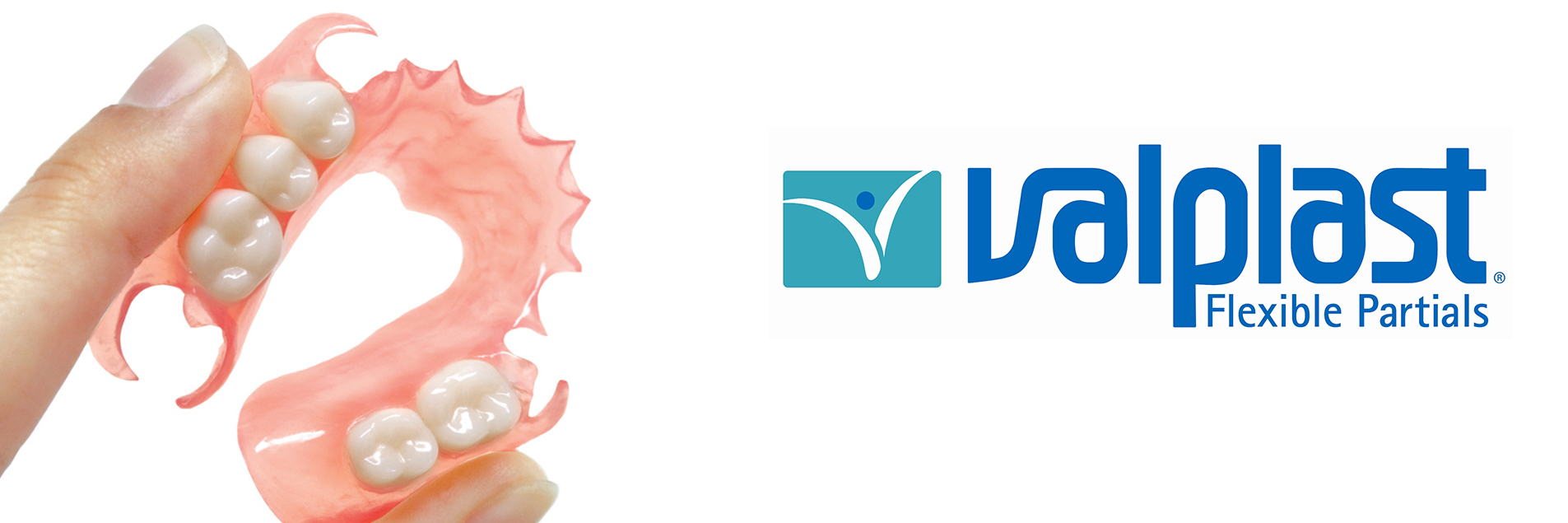Valplast Approved Practice

Clinical dental technicians are registered dental professionals who provide complete dentures direct to patients and other dental devices on prescription from a dentist. They are also, qualified dental technicians.
Patients with natural teeth or implants must see a dentist before the CDT can begin treatment. CDTs refer patients to a dentist if they need a treatment plan or if the CDT is concerned about the patient’s oral health.
Please note, that we work alongside dentists and can refer you if you are not under a dentist’s care.
Flexible dentures are a type of partial denture, which are typically constructed of nylon, or other thin thermoplastics, which differ significantly from the thicker, harder acrylic that is often used in normal dentures. This helps make these types of dentures a lot more bendable and flexible, giving rise to their popular name.
As flexible dentures are made up of softer, more comfortable materials, people of all ages often prefer them over regular dentures. Valplast is a type of flexible denture. The reason Valplast dentures have been a go-to name in the dentistry world for the past five decades is that they provide the best quality partial flexible dentures on the market. Not only that, but they are natural looking, durable, and very comfortable.
However, it is always best to consult with your Clinical Dental Technician with regards to which type of dentures will best suit you, your needs and requirements.
Losing your teeth can be difficult, but it doesn’t necessarily mean saying goodbye to your smile. There are a range of denture options to choose from, accommodating a variety of different people, teeth and mouth types. Flexible dentures are just one of the many types of denture available to you from our denture laboratory in Manchester.
Difference between Valplast dentures & normal dentures
Quality alone makes Valplast dentures stand out from the crowd. The dentures are made from an incredibly strong nylon resin and each comes with a lifetime guarantee protecting them from breakages or fractures. Compared to traditional dentures, Valplast dentures have no metal clasps and the transparent material above the teeth makes them appear more natural. They are lightweight and comfortable too.
Valplast dentures are normally smaller than standard acrylic dentures, allowing the roof of the mouth or the floor of the mouth to be free of denture extensions. This makes them very comfortable and allows patients to taste food more easily. Furthermore, they do not interfere with the tongue as much as acrylic dentures.
Valplast dentures are placed in hot water for a few seconds before wearing. This makes the material soft and flexible. Once inserted into the mouth it moulds itself tightly into place, reducing the need for denture adhesives.
Because of their high-quality design, Valplast dentures can sometimes cost a little more than traditional dentures, but most patients would agree that it is worth the extra money for a more comfortable, natural-looking finish.
These dentures are also available in different gum shades to suit different members of the population.
Are flexible dentures any good?
As their name suggests, flexible dentures are made to adapt to the shape of your gums and teeth, literally ‘flexing’ into position when inserted. These dentures will not typically require any clasps to hold them in place, unlike various alternatives. They are therefore, a great option for people who struggle with the clasps in normal dentures, and the difficulties they may pose.
Some people may have irregularities in their mouth that make wearing normal dentures either difficult or impossible. Flexible dentures can be a great solution to this, able to adapt to the unique shapes and contours of a person’s mouth and palate much better than regular dentures are able to. Flexible dentures can also be good for those who are new to wearing any form of replacement teeth, as regular, harder dentures can sometimes prove to be rather uncomfortable to fully adjust to.
There are many reasons why using flexible dentures can be the right option for you. Your dentist or denture technician can offer advice on the type of dentures that would best suit you and can discuss the possibility of flexible dentures.
The benefits of flexible dentures
There are countless different benefits that can come with wearing flexible dentures; principally, that flexible dentures can a be altogether, a more comfortable option than regular dentures, better adapting to the shape of your gums and teeth. These denture types also will usually not require clasps to hold them in place, making them even more comfortable to wear, and great for those with irregularities in the shape of their mouth.
Key benefits that come with wearing flexible dentures include:
They can look more natural – The material used in flexible dentures is clear, enabling the natural colour of the gum to show through. This can make them look more natural than coloured alternatives.
Quicker to make and fit – Flexible dentures are easier to make, meaning you won’t have to wait as long for your dentures to be ready, as may be the case with other types of dentures. Thus, they will be ready to be fitted sooner than any regular denture equivalents.
Less likely to break – Flexible dentures with soft bases are much less likely to break if they’re dropped compared to other, more rigid and brittle types of dentures. This means that once you have acquired and purchased the necessary flexible denture you need; you will be less likely to ned to order new ones for quite some time.
With these specialised dentures, studies have also found that patients find it easier to chew when wearing them compared to wearing traditional and harder alternatives. The flexibility of the dentures means they can also accommodate a variety of different people, including those who struggle to open their mouth wide, people who may be allergic to certain materials, as well as those with irregularities to the shape of their mouth.
Who is a suitable candidate for Valplast dentures?
Valplast denture designs are very versatile and can be used to replace one, two, or multiple teeth. Patients who suffer allergies to acrylic or metals are also safe to use this type of denture. Patients with ongoing dental problems can still be fitted with a Valplast partial. The denture can be altered or reshaped to incorporate further extractions in the future.
Are there any disadvantages to flexible dentures?
Although flexible dentures can provide a multitude of different benefits, they can also come with a few disadvantages. One of the major disadvantages of these types of dentures is that they can be more prone than regular dentures to build-ups of plaque and bacteria, without a thorough, regular and proper cleaning routine.
Also, although flexible dentures are less likely to break compared to regular dentures, once broken they can prove to be beyond repair and so you would need to purchase a new set, rather than pay for repairs. In practice, this means that purchasing flexible dentures in the short term can be more expensive than regular dentures, even if they ‘pay for themselves’ in the medium and longer terms.
It is therefore important to take great care of your flexible dentures, preventing build-ups of bacteria and keeping them in good condition for as long as possible, much like you would with your own teeth.
Taking care of your flexible dentures
The strong nylon resin makes Valplast dentures virtually unbreakable in everyday life. However, that does not mean you can neglect them. Your dentist will advise you on what hygiene habits you should implement, as well as which cleaning products would work best.
Some Clinical Dental Technicians recommend removing dentures at night when you sleep. We feel that you could wear your denture at night as long as you maintain excellent denture and oral hygiene.
